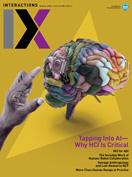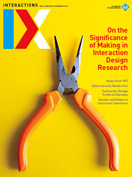Authors:
Loren Terveen
Reaching a global community. This sounds good! Let's think a bit more about what it means for SIGCHI. Distinctive parts of our identity are that we are interdisciplinary and international.
SIGCHI sponsors more than 20 conferences, with well over a thousand papers published each year. Are they reaching all the people we want them to: researchers, practitioners, and students, in computer science, the social sciences, design, and other fields, on every continent?
ACM exists to support the needs of the computing community. For over 60 years, ACM has developed publications and publication policies to maximize the visibility, impact, and reach of the research it publishes to a global community of researchers, educators, students, and practitioners. — ACM INFORMATION FOR AUTHORS
ACM's traditional model of providing access to publications was through subscriptions—someone has to pay. For many members of our community, this isn't a problem. For example, universities in North America subscribe to the ACM Digital Library, and their students, faculty, and staff can access ACM publications for free. However, what about people we'd like to reach who aren't in this fortunate situation? They have to join ACM and subscribe to the ACM Digital Library. Costs vary and can be quite low, but they still may pose a barrier. And what about someone who isn't a member, and has no plans to be, but might come across our publications while searching—do we lose a chance to reach them, to inform them, and to introduce them to our field?
But! ACM has for a while provided several ways for anyone to access publications at no cost, without the need for ACM membership and a Digital Library subscription. Let's review (for details, see: http://authors.acm.org/main.html):
- Authors may post "pre-prints" of their published papers—accepted, author-prepared versions—to their personal home pages, their institution's repository, any repository mandated by an agency that funded the work, and nonprofit repositories (with certain restrictions).
- Authors can post Author-Izer links to the definitive version of their papers in the ACM Digital Library; these links can appear on the author's home page and their institution's repository.
- Authors can pay for perpetual open access to their paper in the Digital Library.
Is this enough? Does this create access for everyone we want to reach? I'm not sure. My assumption was that if you get a paper published, you naturally want to make it as widely available as possible, so you certainly will take advantage of the first two options, even if you don't have funding for the third. In January 2016, I selected 20 papers from the CHI 2015 proceedings at random, and for each paper, did a Google search with a query consisting of the title and authors' names. I expected they'd all be posted—but only 12 out of 20 were. Of course, maybe some of the authors just hadn't gotten around to it yet, but still, this was much lower than I'd expected.
But wait, there's more! Recently ACM introduced the Open Table of Contents (OpenTOC), described as "a unique service that enables Special Interest Groups (SIGs) to open the content from upcoming conferences enabling visitors to download the definitive version from the ACM Digital Library at no charge for a one year period or in perpetuity starting from the conference start date."
Several SIGCHI-sponsored conferences already were using this service, for example:
- MobileHCI 2015: http://mobilehci.acm.org/2015/toc.html
- UIST 2015: http://uist.acm.org/uist2015/basic-program
- UbiComp 2015: http://ubicomp.org/ubicomp2015/program/proceedings.html
Clicking on any of the paper links in the table of contents will take you directly to that paper in the ACM Digital Library. All of these OpenTOCs were set up to provide free access for one year from the conference date. After a year, if you click on a link, you'll still be taken to the Digital Library page for that paper, but now you'll need to have login credentials to get the actual paper.
The SIGCHI Executive Committee decided that, starting with 2016 conferences, all SIGCHI-sponsored conference proceedings will (by default) have an OpenTOC that provides free access to the proceedings in the Digital Library for one year—without requiring authors to take any action.
Why didn't we go with the "in perpetuity" option? To think about this, we need to consider the effect on SIGCHI's revenue. Currently SIGCHI is fortunate enough to have a healthy financial surplus. This lets us survive downturns (as in the early 2000s, when we were in significant financial trouble) and support new initiatives and worthy causes (strengthening HCI in developing countries, locating SIGCHI conferences outside our traditional geographic bases, providing student travel awards, etc.). However, the surplus we currently enjoy is due entirely to revenue we receive from ACM for downloads of SIGCHI content from the Digital Library. Without that, we would just break even. And if we provided OpenTOCs for our conferences in perpetuity, everyone could get the "definitive version" of all our proceedings from the ACM Digital Library at no charge, forever. So why would anyone—individuals or institutions—subscribe to the ACM DL? And if no one did, our surplus would vanish, and we would be forced to make hard choices about which worthy initiatives to support and investments to make. Alternatively, if we wanted to continue supporting these initiatives, we would have to raise conference registration fees, which are our other major source of revenue. And no one likes that idea!
Finally, it's worth mentioning that while the ACM Digital Library has costs, it also has benefits. Papers will be there in perpetuity, no matter what happens to the authors' home pages; rights management is taken care of (authors don't have to do so); and it offers some analytics to understand content usage.
What do you think? Have we struck the right balance between access and financial security? Or should we be doing something else? Here are a few ways you can reach me and other SIGCHI leaders: email me at [email protected] or any of the other SIGCHI officers (see http://www.sigchi.org/people/officers/index_html#EC), post a message to the Chi Meta Facebook group, and come to the SIGCHI Town Hall held each year at CHI.
Loren Terveen, President, ACM SIGHCHI [email protected]
Copyright held by author
The Digital Library is published by the Association for Computing Machinery. Copyright © 2016 ACM, Inc.








Post Comment
No Comments Found